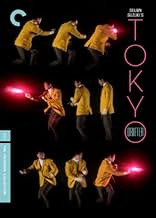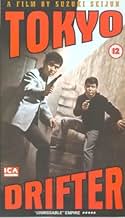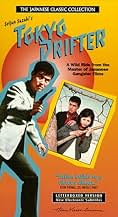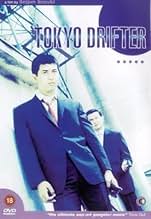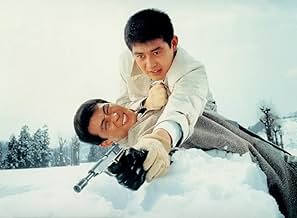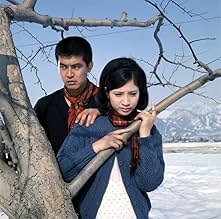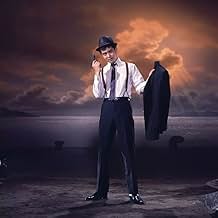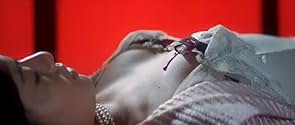NOTE IMDb
7,1/10
10 k
MA NOTE
Lorsque son clan est démantelé, un homme de main des yakuza espère pouvoir quitter le crime organisé, mais il devient vite un vagabond après que son ancien rival tente de l'assassiner.Lorsque son clan est démantelé, un homme de main des yakuza espère pouvoir quitter le crime organisé, mais il devient vite un vagabond après que son ancien rival tente de l'assassiner.Lorsque son clan est démantelé, un homme de main des yakuza espère pouvoir quitter le crime organisé, mais il devient vite un vagabond après que son ancien rival tente de l'assassiner.
- Réalisation
- Scénario
- Casting principal
Avis à la une
In 1966 Nikkatsu, a Japanese studio, requested that one of their more "difficult" directors "calm down" on his next project. The director was Seijun Suzuki. The project was Tokyo Drifter. The result was anything but calm.
A film-noir shot through with moments of brilliant, lurid colour; the film defies all conventions be it genre, style or even something as mundane and unnecessary as narrative. One scene finds Tetsuya Watari's pouting yakuza in a tense showdown with his rival. Standing on train tracks, surrounded by clean, crisp snow the screen is split in two by a clearly visible dark blue line. The use of this visual effect is telling. It adds nothing to the story, to the characterisation, it simply looks good.
The closing sequence has to be seen to be believed. It is best described as the secret lovechild of a Gene Kelly musical and a John Woo action film. Amazing.
If for nothing else, Tokyo Drifter will long be remembered for the theme tune which hauntingly drifts through the entire film.
A film-noir shot through with moments of brilliant, lurid colour; the film defies all conventions be it genre, style or even something as mundane and unnecessary as narrative. One scene finds Tetsuya Watari's pouting yakuza in a tense showdown with his rival. Standing on train tracks, surrounded by clean, crisp snow the screen is split in two by a clearly visible dark blue line. The use of this visual effect is telling. It adds nothing to the story, to the characterisation, it simply looks good.
The closing sequence has to be seen to be believed. It is best described as the secret lovechild of a Gene Kelly musical and a John Woo action film. Amazing.
If for nothing else, Tokyo Drifter will long be remembered for the theme tune which hauntingly drifts through the entire film.
I will argue until my death that TOKYO DRIFTER is superior to BRANDED TO KILL, but that's for another time...
I am amazed every time I see this film that Suzuki could take such an obviously inferior product -- as Nikkatsu Studios was churning out at an obscene rate in those days, giving directors a script and saying "Shoot it fast and cheap so we can give you your next job" -- and turn it into one of the most beautiful and intriguing films I've ever seen.
Best plot ever? No. Easy to follow? Yes. Beautiful? Yes. And that theme...I could never forget that theme if I tried, even after my first viewing.
I'd ramble on about history and plot and so on, but so many others have, I'll just leave it at this: TOKYO DRIFTER makes me happy every time I see it.
I am amazed every time I see this film that Suzuki could take such an obviously inferior product -- as Nikkatsu Studios was churning out at an obscene rate in those days, giving directors a script and saying "Shoot it fast and cheap so we can give you your next job" -- and turn it into one of the most beautiful and intriguing films I've ever seen.
Best plot ever? No. Easy to follow? Yes. Beautiful? Yes. And that theme...I could never forget that theme if I tried, even after my first viewing.
I'd ramble on about history and plot and so on, but so many others have, I'll just leave it at this: TOKYO DRIFTER makes me happy every time I see it.
Unless you have been blessed to track down the films of Suzuki Seijun, you will never, ever, have seen anything like this before. It has a plot - it is a gangster film - a hero, his girl and villains. There are betrayals and gunfights. You still won't have seen anything like this before. Imagine A BOUT DE SOUFFLE, shot in the style of UNE FEMME EST UNE FEMME, with a mixture of Leone, Welles, Melville, THE AVENGERS and Fuller's HOUSE OF BAMBOO. Not even close.
The basic plot concerns the title hero, a gangster trying to go straight. His boss and father-figure (this is a very Oedipal film, but the concept, with its many variations, is stretched to absurd breaking point), also a former gangster, is being pushed around by some extraordinarily attired hoods. The hero has a girl who sings big Michel Legrand-type numbers in a huge, blazingly colourful art deco/Busby Berkeley/Jean Cocteau-type nightclub. Because the hero is a maverick, he lies low for a while (i.e. drifts), but is followed by a hitman. All converges in a fairly predictable fashion.
To appropriate the ad, Plot is Nothing, Style is Everything. If a studio with big resources is, as Welles claimed, a 'toy set', then Seijun is the class freak. The monochrome gangster world is blown apart by shocks of colour, be they dazzling primary hues, or deliberately effete pastels. This serves to upturn the black and white ideology of the gangster genre. The men are all snarling and macho, but the hero sings and whistles, like the Duke's singing cowboy; the lead villain wears loud red shirts and sports a ridiculous moustache. There is even room in the plot for a gag about hairdryers.
Like in Godard, the crucial plot elements are roundly mocked; the seemingly major event of the hero being captured by and subsequently evading the police is as if filmed by an inept child. The group violence scenes are messy, like brawls at a children's party. There is even a bar-room brawl in a Western saloon in a Japanese gangster movie.
Mirroring Melville's heros, the hero aspires to aloof self-sufficiency, but he is constantly undermined by the film. Whole chunks of story don't make sense. The vertiginous editing is like the maniacal string-pulling of a puppeteer ,and there is a strong Brechtian feel to the film, with frequent breaks for cheesy song; impossible sets; unmotivated lighting; some of the most bizarre and beautiful camera movements in film.
All this stylistic bravura could be monotonous if it wasn't grounded intellectually and emotionally. There are some really beautiful oases of grace amid the violent mayhem. The film is a firm attack on the assumptions of genre, conformity, sterile repetition, linked to conformity in Japanese society at large, and big business in particular. Like 50s melodramas, the colour schemes, lighting and composition reflect the state of mind of the characters. The lengthy snow sequence is worthy of Joyce's 'The Dead'.
When it comes to Japanese cinema, I know we're all supposed to bow down to Kurosawa and Ozu, but I'll take the absolutely hatstand Seijun anyday. Breathtaking genius.
The basic plot concerns the title hero, a gangster trying to go straight. His boss and father-figure (this is a very Oedipal film, but the concept, with its many variations, is stretched to absurd breaking point), also a former gangster, is being pushed around by some extraordinarily attired hoods. The hero has a girl who sings big Michel Legrand-type numbers in a huge, blazingly colourful art deco/Busby Berkeley/Jean Cocteau-type nightclub. Because the hero is a maverick, he lies low for a while (i.e. drifts), but is followed by a hitman. All converges in a fairly predictable fashion.
To appropriate the ad, Plot is Nothing, Style is Everything. If a studio with big resources is, as Welles claimed, a 'toy set', then Seijun is the class freak. The monochrome gangster world is blown apart by shocks of colour, be they dazzling primary hues, or deliberately effete pastels. This serves to upturn the black and white ideology of the gangster genre. The men are all snarling and macho, but the hero sings and whistles, like the Duke's singing cowboy; the lead villain wears loud red shirts and sports a ridiculous moustache. There is even room in the plot for a gag about hairdryers.
Like in Godard, the crucial plot elements are roundly mocked; the seemingly major event of the hero being captured by and subsequently evading the police is as if filmed by an inept child. The group violence scenes are messy, like brawls at a children's party. There is even a bar-room brawl in a Western saloon in a Japanese gangster movie.
Mirroring Melville's heros, the hero aspires to aloof self-sufficiency, but he is constantly undermined by the film. Whole chunks of story don't make sense. The vertiginous editing is like the maniacal string-pulling of a puppeteer ,and there is a strong Brechtian feel to the film, with frequent breaks for cheesy song; impossible sets; unmotivated lighting; some of the most bizarre and beautiful camera movements in film.
All this stylistic bravura could be monotonous if it wasn't grounded intellectually and emotionally. There are some really beautiful oases of grace amid the violent mayhem. The film is a firm attack on the assumptions of genre, conformity, sterile repetition, linked to conformity in Japanese society at large, and big business in particular. Like 50s melodramas, the colour schemes, lighting and composition reflect the state of mind of the characters. The lengthy snow sequence is worthy of Joyce's 'The Dead'.
When it comes to Japanese cinema, I know we're all supposed to bow down to Kurosawa and Ozu, but I'll take the absolutely hatstand Seijun anyday. Breathtaking genius.
If you are fed up by ordinary manufactured campiness, but still have normal levels of humor.. Which is to say if you find Austin Powers not only boring but trivial, you might check this out. It is high camp. It is ridiculous in ways that in other action films we readily accept: think the recent James Bonds. There is a joke product placement — for hair driers — that is really funny.
We have the ordinary sort of thing that qualifies: cheesy songs, goofy hero, posed action, jingly hipness. But we have a level of cheesiness that goes beyond the Tarrantino level, beyond the usual joke. The cinematography is one big joke, one that still works today because the big movies still use Vietnam era visual devices.
We have jokes on Bertralucci, Welles, Kurosawa. Leone of course. We have a couple stagings from Bergman even. It is not worth the effort to single out any Frenchman it seems, treating them with the contempt of wholesale dismissal.
Under ordinary circumstances, I would not recommend this because the usual level of the joke gets pretty tiring after 20-30 minutes. But the cinematic jokes and references keep coming, as though there were a catalogue (like we are told the Coen brothers keep). The blatant vacancy of the visuals is pretty damning.
Ted's Evaluation -- 2 of 3: Has some interesting elements.
We have the ordinary sort of thing that qualifies: cheesy songs, goofy hero, posed action, jingly hipness. But we have a level of cheesiness that goes beyond the Tarrantino level, beyond the usual joke. The cinematography is one big joke, one that still works today because the big movies still use Vietnam era visual devices.
We have jokes on Bertralucci, Welles, Kurosawa. Leone of course. We have a couple stagings from Bergman even. It is not worth the effort to single out any Frenchman it seems, treating them with the contempt of wholesale dismissal.
Under ordinary circumstances, I would not recommend this because the usual level of the joke gets pretty tiring after 20-30 minutes. But the cinematic jokes and references keep coming, as though there were a catalogue (like we are told the Coen brothers keep). The blatant vacancy of the visuals is pretty damning.
Ted's Evaluation -- 2 of 3: Has some interesting elements.
Sensible logic might be little, but director Suzuki Seijun's surrealistic pop-art gangster feature "Tokyo Drifter" is a tour-de-fore in flamboyant, and unusual film-making. Everything about this fashionably unhinged effort reeks of ultra-coolness, with its edgy but trendy stylish guidance painting an influential pathway for many film-makers to experiment, but also providing familiar staples of noir and western inspirations to its own brash, creative juices. I admit the busily dry story is quite an unbalanced muddle, with fractured editing, but still for that time glamorously unconventional and erratically bewildering. The focus of the material is that of devotion (of business and love), but some quirky sight gags and mayhem make there way in. Mainly it's all about the majestic set-pieces though, and the delirious appeal of them are a wondrously enchanting sight. A trippy colour scheme infuses itself on the psychedelically warped set-designs of moody composition lighting, and the sudden bursts of exaggerated violence have a poetically tough awe surrounding it. The taut pace of the film stays pretty much on cruise control, but where the energy feeds off can be linked to Kaburagi So's fierily dramatic jazz musical score, and Mine Shigeyoshi's intimately snappy cinematography positioning. Even breaking up the murky narrative are odd song choices and a rhythmic theme. The colourful performances are dashing, and life-like with a brooding array of interesting characters. Testsuya Watari, HidekaI Nitani, Ryuji Kita, Chieko Matsubara and Eiji Go are enjoyably tailored to their parts. Highly stylised fun.
Le saviez-vous
- AnecdotesWas shot and edited in 28 days.
- Citations
Tetsuya 'Phoenix Tetsu' Hondo: A drifter needs no woman.
- ConnexionsFeatured in Seijun Suzuki | TCM (2013)
Meilleurs choix
Connectez-vous pour évaluer et suivre la liste de favoris afin de recevoir des recommandations personnalisées
- How long is Tokyo Drifter?Alimenté par Alexa
Détails
Box-office
- Montant brut mondial
- 755 $US
- Durée1 heure 29 minutes
- Couleur
- Mixage
- Rapport de forme
- 2.35 : 1
Contribuer à cette page
Suggérer une modification ou ajouter du contenu manquant


